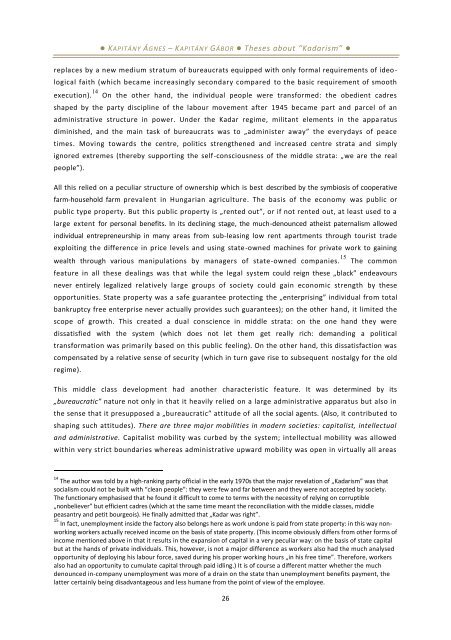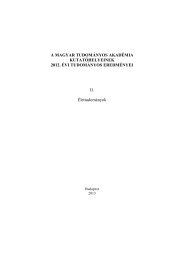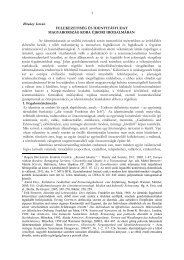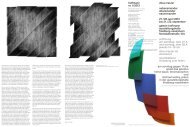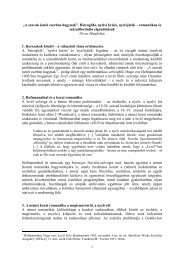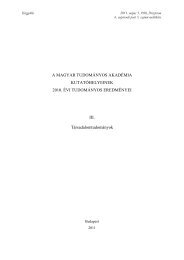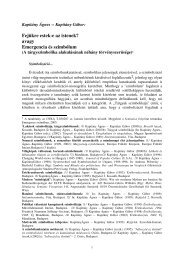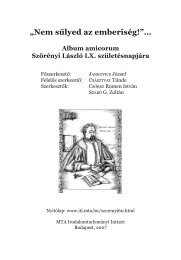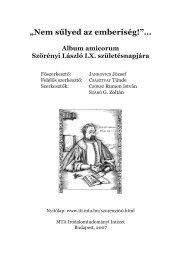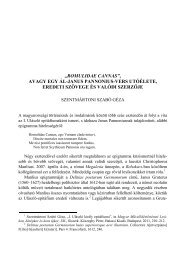symbolic elements of everyday culture - MTA Szociológiai ...
symbolic elements of everyday culture - MTA Szociológiai ...
symbolic elements of everyday culture - MTA Szociológiai ...
Create successful ePaper yourself
Turn your PDF publications into a flip-book with our unique Google optimized e-Paper software.
● KAPITÁNY ÁGNES – KAPITÁNY GÁBOR ● Theses about “Kadarism” ●<br />
replaces by a new medium stratum <strong>of</strong> bureaucrats equipped with only formal requirements <strong>of</strong> ideo -<br />
logical faith (which became increasingly secondary compared to the basic requirement <strong>of</strong> smooth<br />
execution). 14 On the other hand, the individual people were transformed: the obedient cadres<br />
shaped by the party discipline <strong>of</strong> the labour movement after 1945 became part and parcel <strong>of</strong> an<br />
administrative structure in power. Under the Kadar regime, militant <strong>elements</strong> in the appa ratus<br />
diminished, and the main task <strong>of</strong> bureaucrats was to „administer away” the <strong>everyday</strong>s <strong>of</strong> peace<br />
times. Moving towards the centre, politics strengthened and increased centre strata and simply<br />
ignored extremes (thereby supporting the self-consciousness <strong>of</strong> the middle strata: „we are the real<br />
people”).<br />
All this relied on a peculiar structure <strong>of</strong> ownership which is best described by the symbiosis <strong>of</strong> cooperative<br />
farm-household farm prevalent in Hungarian agri<strong>culture</strong>. The basis <strong>of</strong> the economy was public or<br />
public type property. But this public property is „rented out”, or if not rented out, at least used to a<br />
large extent for personal benefits. In its declining stage, the much-denounced atheist paternalism allowed<br />
individual entrepreneurship in many areas from sub-leasing low rent apartments through tourist trade<br />
exploiting the difference in price levels and using state-owned machines for private work to gaining<br />
wealth through various manipulations by managers <strong>of</strong> state-owned companies. 15 The common<br />
feature in all these dealings was that while the legal system could reign these „black” endeavours<br />
never entirely legalized relatively large groups <strong>of</strong> society could gain economic strength by these<br />
opportunities. State property was a safe guarantee protecting the „enterprising” individual from total<br />
bankruptcy free enterprise never actually provides such guarantees); on the other hand, it limited the<br />
scope <strong>of</strong> growth. This created a dual conscience in middle strata: on the one hand they were<br />
dissatisfied with the system (which does not let them get really rich: demanding a political<br />
transformation was primarily based on this public feeling). On the other hand, this dissatisfaction was<br />
compensated by a relative sense <strong>of</strong> security (which in turn gave rise to subsequent nostalgy for the old<br />
regime).<br />
This middle class development had another characteristic fea ture. It was determined by its<br />
„bureaucratic” nature not only in that it heavily relied on a large administrative apparatus but also in<br />
the sense that it presupposed a „bureaucratic” attitude <strong>of</strong> all the social agents. (Also, it contributed to<br />
shaping such attitudes). There are three major mobilities in modern societies: capitalist, intellectual<br />
and administrative. Capitalist mobility was curbed by the system; intellectual mobility was allowed<br />
within very strict boundaries whereas administrative upward mobility was open in virtually all areas<br />
14 The author was told by a high-ranking party <strong>of</strong>ficial in the early 1970s that the major revelation <strong>of</strong> „Kadarism” was that<br />
socialism could not be built with “clean people”: they were few and far between and they were not accepted by society.<br />
The functionary emphasised that he found it difficult to come to terms with the necessity <strong>of</strong> relying on corruptible<br />
„nonbeliever” but efficient cadres (which at the same time meant the reconciliation with the middle classes, middle<br />
peasantry and petit bourgeois). He finally admitted that „Kadar was right”.<br />
15 In fact, unemployment inside the factory also belongs here as work undone is paid from state property: in this way nonworking<br />
workers actually received income on the basis <strong>of</strong> state property. (This income obviously differs from other forms <strong>of</strong><br />
income mentioned above in that it results in the expansion <strong>of</strong> capital in a very peculiar way: on the basis <strong>of</strong> state capital<br />
but at the hands <strong>of</strong> private individuals. This, however, is not a major difference as workers also had the much analysed<br />
opportunity <strong>of</strong> deploying his labour force, saved during his proper working hours „in his free time”. Therefore, workers<br />
also had an opportunity to cumulate capital through paid idling.) It is <strong>of</strong> course a different matter whether the much<br />
denounced in-company unemployment was more <strong>of</strong> a drain on the state than unemployment benefits payment, the<br />
latter certainly being disadvantageous and less humane from the point <strong>of</strong> view <strong>of</strong> the employee.<br />
26


